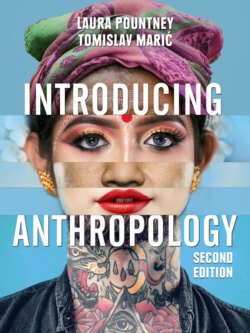Читать книгу Introducing Anthropology - Laura Pountney - Страница 16
Scientific explanations of human origins
ОглавлениеThe Enlightenment and Victorian naturalism The eighteenth-century Enlightenment prompted a major revolution in the way Europeans thought of the world in which they lived. Whereas previously the Bible had been relied upon to explain the world, people began increasingly to seek explanations based on science and rational thought. The Enlightenment coincided with the expansion of Europeans across the world and the discovery of previously unknown peoples. This diversity of humanity needed explaining somehow, since there were clearly many more human populations in the world than were described in the Bible.
Enlightenment A period in Europe during the eighteenth century when there were many scientific discoveries that contradicted the accepted teachings of those in authority, notably the Church
Later, through the work of nineteenth-century British naturalists influenced by Enlightenment ideals, an alternative explanation to creationism emerged: the idea that new species arose from existing ones through a long and gradual process of transformation, known as evolution. Charles Darwin (1809–82) is best known for his theory of evolution by natural selection or, in other words, the view that competition for resources (the ‘struggle for survival’) is both unavoidable and ubiquitous in nature and is the driving force behind the continuous transformation of living forms.
evolution Any change across successive generations in the inherited characteristics of biological populations
Darwin’s theory of natural selection was one of many emerging ideas of the time that attempted to explain the diversity of animals and species found in the world. Alfred Russell Wallace (1823–1913), a naturalist working independently of Darwin at around the same time, developed a very similar theory. Both Darwin and Wallace presented their ideas to the public in 1858, which caused great controversy because they directly challenged prevailing religious explanations.
What is natural selection? Natural selection is a process whereby nature selects the forms most likely to survive and reproduce in a particular population. For natural selection to work, there needs to be inheritable (i.e., genetic) variation within populations – which there usually is – as well as competition for resources necessary for life, such as food and space. Those organisms that manage to get copies of their genes into future generations transmit characteristics that continue to evolve through the generations. Over time, the organisms that are less successful in passing on their genes, and are less suited to their surroundings, gradually die out, while the more successful organisms survive. This process changes according to the environment in which the species exist. Changes to the body that are acquired in the course of life, for example loss of a limb, do not get passed on.
natural selection The process in nature by which, according to Darwin’s theory of evolution, only the organisms best adapted to their environment tend to survive and transmit their genetic characteristics in increasing numbers to succeeding generations, while those less well adapted tend to be eliminated
Sexual selection In order to leave descendants, individuals must not only survive but also reproduce. As a supplement to the principle of natural selection, Charles Darwin developed the idea of sexual selection to attempt to explain the presence of characteristics of male animals, such as the elaborate tails of peacocks or men’s deep voices, claiming that these secondary sexual characteristics evolved not because they increase the survival prospects of individuals, but because females prefer to mate with individuals with those features. If this is the case, then those specific characteristics are more likely to be passed on to future generations.
In birds, for example, one form of sexual selection occurs when males compete for particular territories. A bird that manages to get the best location is more likely to be chosen as a mate. Geoffrey Miller (2000) develops Darwin’s ideas and argues that human culture arose through a process of sexual selection. He argues that there are many characteristics of human culture that are not necessary to survival yet play a strong role in sexual selection, for example humour. Miller believes that human culture arose through sexual selection for creative traits. In summary, since the main challenges faced by living beings are survival and reproduction, species are the outcome of both natural and sexual selection. Evolutionary anthropologists are still debating which features of humans were caused by natural selection and which were the result of sexual selection.
This peacock’s tail is an example of female preference driving the evolution of longer, more colourful tail feathers. (Taychin Olarnwichitwong / Unsplash)
STOP & THINK
Can you think of other traits that humans might look for in each other that are not necessary for survival?
